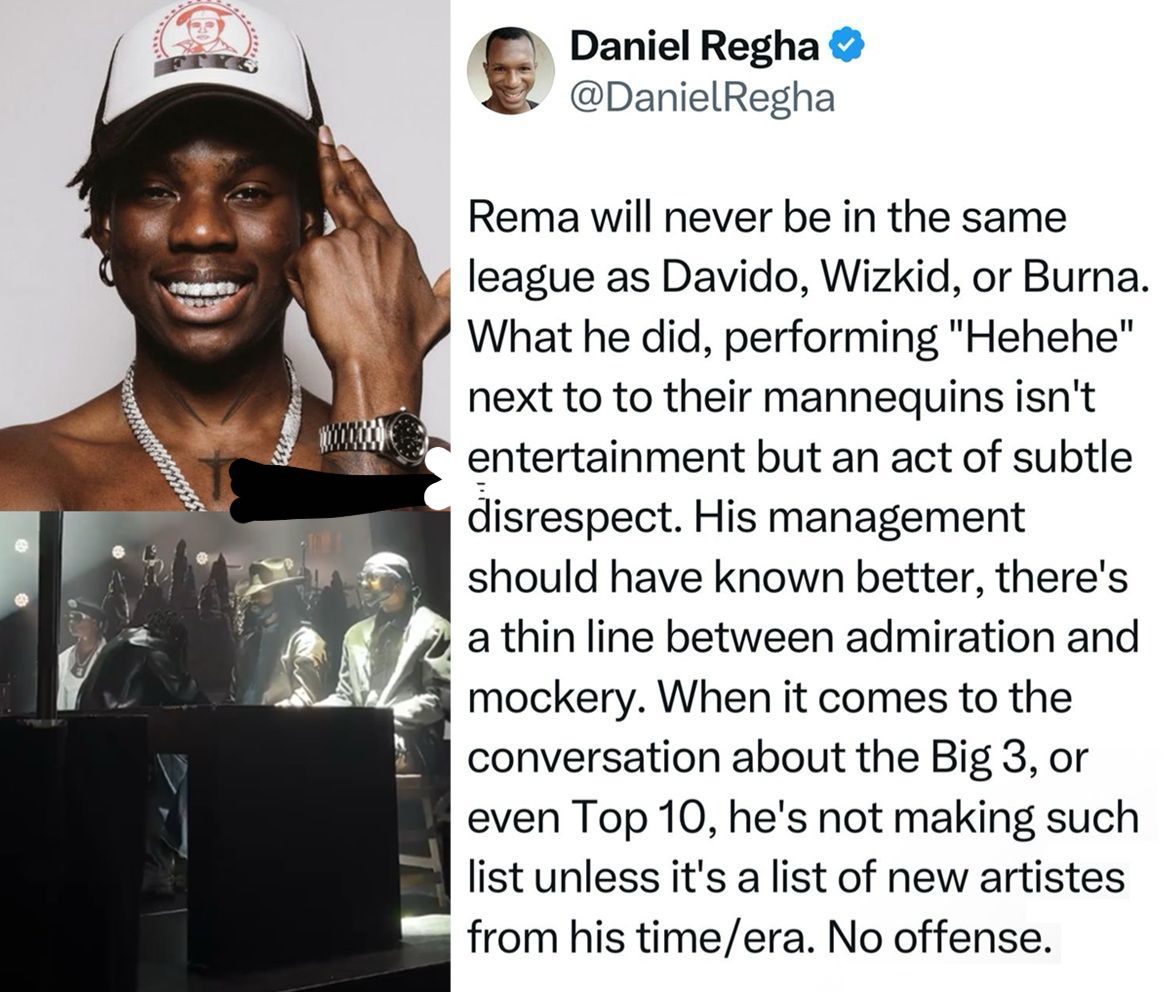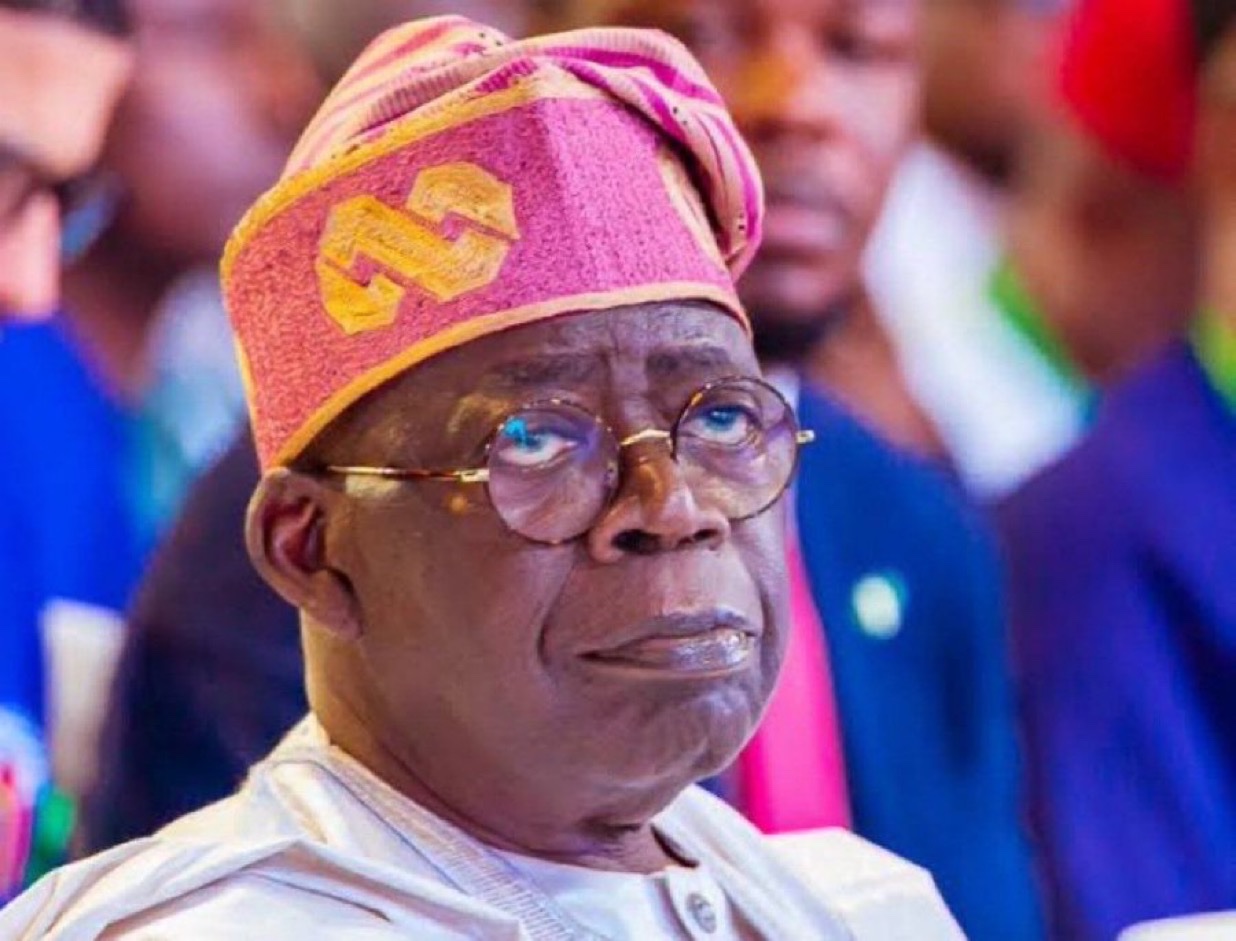
“That’s Not Entertainment, It’s Disrespect”: Daniel Regha Slams Rema Over ‘Big 3’ Mannequin Stunt at MSG Show

Nigerian Twitter critic and pop culture commentator Daniel Regha has sparked fresh controversy online following his heated reaction to Rema’s recent performance at the Madison Square Garden (MSG) in New York. The Mavin Records star, who has often been hailed as a futuristic force in Afrobeats, made headlines for a daring segment in his show where he performed the track “Hehehe” beside life-sized mannequins representing Nigerian music’s so-called “Big 3” — Wizkid, Davido, and Burna Boy. While some fans saw it as a moment of creative expression or subtle commentary, Regha didn’t mince words in calling the stunt an act of “subtle disrespect.”
Taking to X (formerly Twitter), Regha wrote: “Rema will never be in the same league as Davido, Wizkid, or Burna. What he did, performing 'Hehehe' next to their mannequins isn't entertainment but an act of subtle disrespect. His management should have known better. There's a thin line between admiration and mockery.” The post quickly ignited debate, trending within hours and attracting both praise and backlash from music fans, artists, and social media users alike.
Regha’s words struck a chord because they touched on a topic that has long been a point of contention in Afrobeats discourse — the hierarchy of fame and influence within the genre. The so-called “Big 3,” comprising Wizkid, Davido, and Burna Boy, have dominated the industry for over a decade, not only in Africa but globally. For many, they represent the pinnacle of success, with Grammy wins, platinum records, and sold-out arenas worldwide to show for it. Rema, on the other hand, is a member of the newer wave — young, bold, experimental, and already blazing his own trail with hits like “Calm Down,” which topped international charts and broke streaming records.
But to Regha, creativity has its limits, and this particular MSG moment crossed the line. “When it comes to the conversation about the Big 3, or even Top 10, he's not making such list unless it's a list of new artistes from his time/era,” Regha continued. “No offense.” Despite the “no offense” disclaimer, the jab landed hard among Rema’s fans, who quickly rose to his defense.
Some argued that Rema’s mannequin act was more symbolic than disrespectful — possibly a commentary on the way legends are immortalized, frozen in time, while a new generation takes the spotlight. Others said it could have been an homage, even if unorthodox, to the very icons who paved the way for him. Whatever the intention, the optics of the performance — Rema energetically vibing to “Hehehe,” a song filled with mischievous energy and laughter, next to lifeless figures of his predecessors — were undeniably provocative.
It also reignited the age-old generational clash between Afrobeats veterans and the genre’s Gen Z vanguard. Some critics echoed Regha’s sentiments, saying Rema should have shown more humility and respect to artists whose legacies dwarf his. But others pushed back, arguing that the industry evolves and newer acts should be allowed to challenge, critique, and even playfully mock the past as part of pushing the culture forward.
Adding fuel to the fire is the fact that Rema has always carried himself with a sense of uniqueness and disruption. He has openly spoken about not wanting to be boxed into traditional Afrobeats sounds, branding his music as “Afrorave.” His style, fashion, and even public persona are often described as edgy and unpredictable — a trait that endears him to younger fans but unsettles more conservative voices in the industry.
The performance at MSG, which marked a major milestone in Rema’s global expansion, was meant to be a showcase of artistic evolution and a declaration of his place in the world of music. It featured high production value, futuristic visuals, and an experimental tone that had critics applauding his ambition. But for Regha and others like him, the use of Wizkid, Davido, and Burna Boy mannequins overshadowed everything else.
Interestingly, none of the “Big 3” have reacted publicly to the stunt or to Regha’s comments. Their silence, whether strategic or simply indifferent, leaves room for multiple interpretations. Some believe they may have been too focused on their own projects to care, while others think they may be waiting to address it in their own way — either through music or a subtle social media jab down the line.
Meanwhile, Rema himself has yet to directly address the backlash, a move that some interpret as calculated. Known for his cryptic tweets and carefully curated image, he may be letting the conversation swirl to build more buzz around his tour and new releases. Still, the moment has placed him squarely in the middle of a cultural debate: what does it mean to honor the past while forging the future? And where do we draw the line between artistic expression and perceived disrespect?
Daniel Regha, no stranger to controversy himself, seems content to let the internet do the rest of the talking. His post has since been reposted thousands of times, with influencers, music analysts, and fans all weighing in. As with many of Regha’s viral takes, the conversation has grown beyond just the performance — it’s now about legacy, generational pride, creative freedom, and the inevitable tensions that arise when a new king-in-the-making rattles the thrones of the reigning monarchs.
In an industry where perception can be just as powerful as talent, Rema’s mannequin moment may go down as one of the most polarizing visuals in recent Afrobeats history. Whether it was a genius artistic risk or a moment of poor judgment is up for debate, but one thing is clear — the conversation around who gets to define greatness in Nigerian music is far from over.


